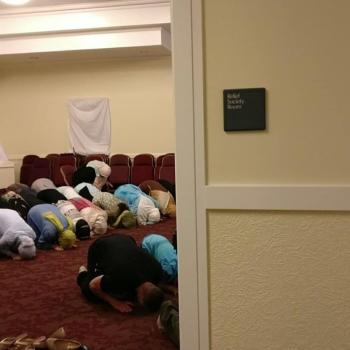
(Image from the Islamic Center website)
A short snippet from my manuscript-in-progress about Islam for a Latter-day Saint audience:
With the conversion of Christians from Aramaic and Greek and Coptic backgrounds, with the entry into Islam of large numbers of Persians, and with the conquest of areas where Indian culture prevailed, the Arabs gained access to the unimaginable richness of world civilizations stretching from the Atlantic to the Himalayas. A great new world civilization was being formed, a distinctive one that drew upon virtually all of its predecessors but refined them through a comprehensive new religious worldview. The leaders of the empire eventually proved themselves voracious consumers of world culture. They devoured everything they could get. They set up professional translation bureaus that systematically gathered scientific, medical, and philosophical texts from around the world (especially from Greek) and rendered them into Arabic. It was a time of great prosperity, of commercial expansion, and cultural blossoming.
But the Umayyads, with backward ideas, had to leave. They had offended vast numbers of their subjects and they had ruthlessly put down various rebels against their rule. They killed the Shiite leader Husayn ibn Ali ibn Muhammad and butchered most of his family. Their reluctance to treat their non-Arab subjects as equals— even when those subjects had converted to Islam—irritated vast numbers of people across the empire. Pious Muslims, those most concerned with the implications of Islam, also found much left to be desired in Umayyad rule. They feared that their fellow believers were enjoying the fruits of the Arab conquests with perhaps a little too much enthusiasm and were not really serious about Islam. Furthermore, they insisted, it was Islam that was to be the basis of society, not mere Arabness. (After all, they pointed out, it had been only a few years since “Arabness” meant paganism and female infanticide.)
The alienation of these pious Muslims was crucial for the direction in which Islam was to evolve. It is from this period that Islamic law and tradition began to develop virtually in oppositional mode, as mentioned previously.
***
I’m grateful to Matthew Wheeler for calling this item to my notice:
“8 touching stories of Jewish and Muslim friendship from 2014”
Many people think that animosity between Arabs and Jews goes back to Abraham. This is not true. And there is no necessary reason for it today. It’s about politics, not religion or ethnicity as such.












